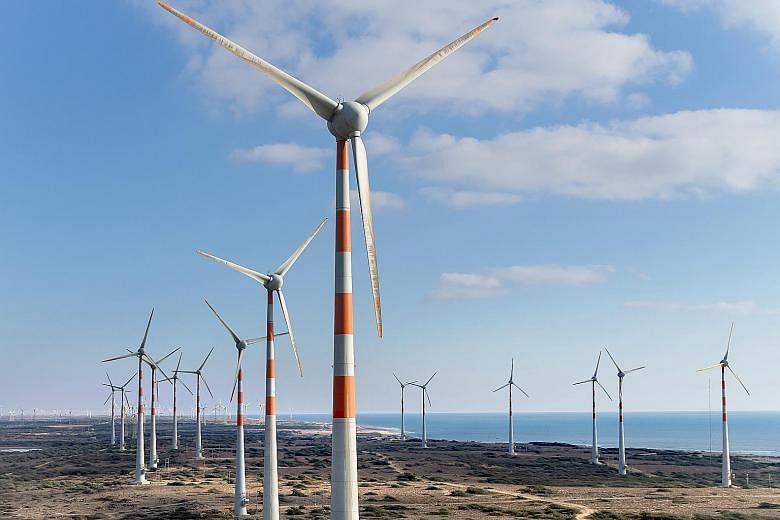Asia is in dire need of more roads, railways and utility plants, and that means opportunities for Singapore companies in the lucrative infrastructure development sector.
A number of large firms, including conglomerate Sembcorp Industries, have already made significant inroads into developing infrastructure across the region.
But small and medium-sized enterprises (SMEs) keen on taking on infrastructure projects often find it tough to obtain the funds needed.
GOVERNMENT SUPPORT
South-east Asia will need infrastructure investments of US$2.76 trillion (S$3.9 trillion) between 2016 and 2030, says the Asian Development Bank. There will be plenty of small- scale projects valued at between $5 million and $70 million, said Minister for Trade and Industry (Industry) S. Iswaran during the Budget debate in Parliament last month.
"However, (SMEs') expansion is constrained by limited access to project financing for small projects. Typically, commercial lenders are less prepared to provide financing to SMEs unless they put up personal guarantees or recourse to the company's assets. This makes it difficult for our SMEs to scale up," he noted.
In response, trade agency International Enterprise (IE) Singapore will soon provide backing for non- recourse bank loans to SMEs.
These are loans secured only by the project assets and its cash flow, limiting the impact on a borrower in the event of a default.
The initiative, to be outlined in detail later, is an enhancement to the Internationalisation Finance Scheme, under which IE Singapore co-shares the default risk of loans provided by the scheme's 12 financial institution partners, including the three local banks.
"Companies will be able to finance a larger number of overseas infrastructure projects concurrently by taking up non-recourse financing at the post-construction phase - the stable operating phase of projects - to scale up their track record more quickly," IE Singapore environment and infrastructure solutions director Kow Juan Tiang explained to The Straits Times.
"IE Singapore is working with SMEs to capture smaller-scale utility infrastructure projects in the region - namely Indonesia, Myanmar and Vietnam," Mr Kow added.
"It could be harder for smaller companies to capture larger municipal projects given resource constraints, but they can address smaller-scale industrial projects for power, water and liquefied natural gas."
RISK CONCERNS
While there may be ample potential, funding access remains crucial - and sometimes elusive.
Memiontec, which made the news last year for a joint-venture project to build a water treatment plant in Jakarta, said banks look at factors such as costs and returns to assess bankability.
"When we do a project in an overseas market, there is always uncertainty... and banks - particularly those unfamiliar with the market - have to do a lot of due diligence, which will cost money. If the project is too small, obviously it won't be bankable," Memiontec chief financial officer Roger Chua said.
"So usually it's the banks more familiar with a certain market that are more willing to provide the financing," Mr Chua added. Memiontec received its funding for the Jakarta project from an Indonesian lender.
Due diligence is a process where a bank investigates factors such as a client's financials and track record as well as market-related risks to ensure the viability of a transaction.
The long development cycle of such projects implies a higher degree of default risk, which is a potential downer for a financing deal.
TEE Infrastructure executive director Edwin Neo noted that construction of the company's Philippine power plant project started two years ago, and it will come online only at the end of this year. "In these two years it generates no income, and only after would I start paying down the loan if I had any."
The infrastructure subsidiary of listed engineering firm TEE International has a $5 million investment in the power plant project near Iligan, Mindanao, in the Philippines. The company is still relying on existing cash flow from the group's core businesses to finance its infrastructure ventures.
"But we'd need to tap financing if we want to scale up. That means we need to build up our capabilities and track record to show that we can handle not only O&M (operation and maintenance) but also the EPC (engineering, procurement and construction) of a project," Mr Neo said.
"That also means we will have multiple income streams in a venture. If banks can see that scalability, they'd be more willing to provide financing."
NO LACK OF OPTIONS
United Overseas Bank's foreign direct investment (FDI) advisory unit head Sam Cheong said banks are always at the ready to help SMEs structure a feasible deal for both parties.
"Banking is about managing risks. So long as a company works with us to understand the risks and find ways to mitigate them, I don't think any bank will turn down a good project," he said.
Mr Cheong added that infrastructure financing is a "fast-growing part" of the FDI business, which in six years has facilitated over $50 billion worth of investments and trade across South- east Asia by clients, including some 300 local firms.
One of them was Royal GK, when it joined a Yangon power plant project to provide engine procurement.
"With the One Belt, One Road initiative, we are seeing a lot more major companies using Singapore as a hub for regional developments. So one thing that we hope to do more is business matching - to work with IE Singapore and the Economic Development Board and connect more local SMEs with the big boys in this space," Mr Cheong said.
Meanwhile, it is not just the banks that can play a role, Mr Neo said, adding: "Singapore is building a vibrant infrastructure hub, with a growing number of infrastructure funds and foreign banks forming a complete ecosystem. We are in fact in contact with many of them."
Temasek Holdings-affiliated platforms Clifford Capital and Pierfront Capital provide financing solutions to companies in the infrastructure, oil and gas and shipping industries, among others.
And it is not just the money that counts, said Memiontec's Mr Chua, noting that overseas partnerships and networks are also important for SMEs.
"We linked up with our joint-venture partner Jakarta Utilitas Propertindo through IE Singapore's introduction. I wouldn't say it wouldn't have happened otherwise, but our agencies help a lot in taking us overseas, and their backing also adds to our credibility," he said.
Another way to help SMEs is through talent development support, IE Singapore's Mr Kow said.
An upcoming Global Ready Infrastructure Talent programme will be rolled out by the Government to build a local talent pipeline.
This will involve on-the-job training and industry exposure for professionals, managers and executives. IE Singapore will give more details this quarter, he said.


